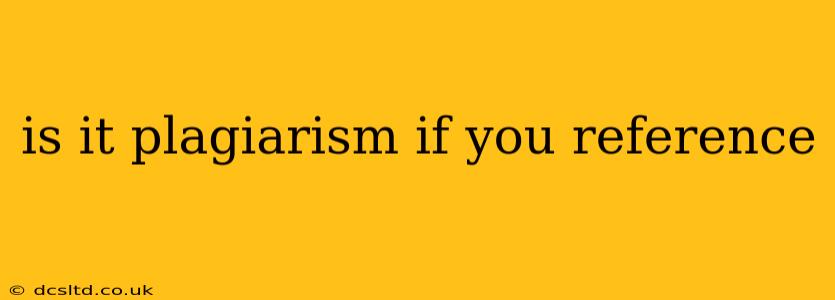Is It Plagiarism If You Reference? A Comprehensive Guide to Avoiding Academic Dishonesty
The question of whether referencing constitutes plagiarism is a crucial one for students, researchers, and writers alike. The short answer is: no, properly referencing sources is not plagiarism. However, the "properly" part is key and requires careful attention to detail. Plagiarism occurs when you present someone else's work or ideas as your own, without giving them proper credit. Referencing, on the other hand, acknowledges the original source and gives credit where it's due.
Let's delve deeper into the nuances of referencing and how to avoid accidentally committing plagiarism.
What is Referencing and Why is It Important?
Referencing is the process of acknowledging the sources you've used in your work. This includes books, articles, websites, interviews, and any other material that has contributed to your research or writing. It's crucial for several reasons:
- Giving Credit: It's ethically right to acknowledge the intellectual property rights of others.
- Building Credibility: Proper referencing demonstrates the thoroughness of your research and strengthens the credibility of your work.
- Avoiding Plagiarism: As mentioned, this is the primary reason for referencing. It clearly distinguishes your ideas from those of others.
- Allowing Verification: Readers can check your sources to verify your claims and understand the basis of your arguments.
- Contributing to Academic Discourse: Referencing allows for the continuation and expansion of knowledge by building upon existing research.
How to Properly Reference to Avoid Plagiarism
Proper referencing involves more than just listing your sources at the end. It requires consistent citation throughout your text, clearly indicating which ideas, facts, or quotes belong to whom. Different academic disciplines and institutions have specific referencing styles (e.g., MLA, APA, Chicago). It's crucial to adhere to the style guide specified by your institution or publication.
Key elements of proper referencing include:
- In-text citations: These appear within your text, immediately following the information you've borrowed, indicating the source. They typically include the author's last name and year of publication (or a shortened version of the source title if no author is available).
- Bibliography or Works Cited: This is a list of all the sources you've cited in your work, presented at the end according to the chosen style guide. This list provides complete bibliographic details, allowing readers to easily locate the sources themselves.
- Accurate Information: Ensure all details in your citations and bibliography are accurate and consistent. A single mistake can cast doubt on the integrity of your entire work.
- Quotation Marks: Always use quotation marks when directly quoting material from a source. Paraphrasing, while still requiring citation, allows for greater flexibility in phrasing while still acknowledging the original source.
What Constitutes Plagiarism Even With References?
Even with references, you can still commit plagiarism if you:
- Improperly paraphrase: Simply changing a few words while retaining the original sentence structure is still plagiarism. A paraphrase should significantly alter the sentence structure and wording while still conveying the same information.
- Self-plagiarism: Submitting work that you have already submitted for another assignment without permission is also plagiarism.
- Inconsistent or incorrect citations: Errors in your referencing, even unintentional ones, can be viewed as an attempt to deceive and thus, plagiarism.
- Over-relying on sources: While referencing is essential, your work should primarily reflect your own analysis and interpretation. Over-reliance on sources can dilute your original contribution.
How to Check for Plagiarism Before Submission
Many universities and colleges provide plagiarism-checking software. Familiarize yourself with the tools available to you. Beyond software, carefully reviewing your work and comparing it to your sources is a crucial step in ensuring academic integrity.
By understanding the principles of proper referencing and diligently applying them, you can avoid plagiarism and ensure the ethical and credible presentation of your work. Always consult your institution's guidelines on academic integrity for specific requirements and further clarification.
